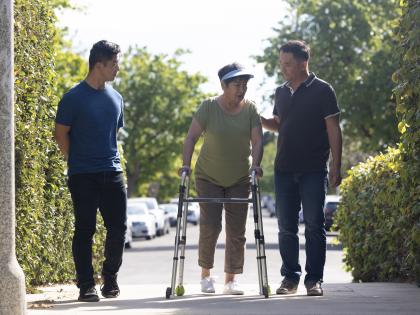Georgia State Alzheimer’s Plan Overview

In 2013, the Georgia General Assembly established the Georgia Alzheimer’s Disease and Related Dementias State Plan Task Force through passage of Senate Bill 14 to research the impact of the disease and develop a strategy to mobilize the state response to the growing public health threat posed by Alzheimer’s. The Task Force included representatives from state agencies, local health departments, research institutes, law enforcement, care provider associations, elder law, and community organizations as well as state legislators, caregivers, community members, and individuals directly impacted by Alzheimer’s. Building upon previous work completed by the Georgia Division of Aging Services, the Task Force solicited public input and drafted the Georgia Alzheimer’s Disease and Related Dementias State Plan. The plan was published in June 2014.
Building off of the State Plan released in 2014, the Georgia Alzheimer’s and Related Dementias (GARD) Council released an update to the GARD State Plan in 2020. The updated State Plan contains goals for the state to provide necessary services and programs for Georgians affected by dementia and cognitive decline. Among the goals include strengthening research and data; enhancing efforts to develop a dementia-capable workforce; and improving service delivery for people living with dementia and their caregivers.
Georgia 2026 Policy Priorities

Increase Funding for the Alzheimer’s and Dementia Caregiver Support Program
Georgia is home to over 188,000 individuals living with Alzheimer’s and 384,000 caregivers. These caregivers are providing unpaid care, often enabling their loved ones living with dementia to live in the community instead of moving into more costly residential long-term care. The Alzheimer’s Association is urging state lawmakers to appropriate an additional $2 million in annual funding to the Alzheimer’s and Dementia Caregiver Support program that provides respite services to ensure family caregivers have the support they need.
Support Dementia Training for Court-Appointed Guardians
Dementia can significantly affect a person’s ability to make decisions, and in the absence of other advanced directives, people living with dementia may need the assistance of a guardian or conservator. Once appointed, a guardian may make decisions for the individual that relate to the person’s health, well-being and economic interest. With such responsibility, it is imperative that court-appointed guardians receive dementia training. The Alzheimer’s Association is calling on state lawmakers to update the guardianship statutes to require those who are serving people living with dementia to have dementia-specific training.
Sign Up to Learn About Advocacy Opportunities in Georgia

Find My Chapter
Together, we’re making an impact. Find an Alzheimer’s Association chapter in your community for more ways to engage.
Contact Us
State Affairs Contact: Tatiana Gonzalez Quiroga
Phone: 504.662.9314
Email: tgquiroga@alz.org
188,300
people living with Alzheimer’s in Georgia
384,000
Georgians are providing unpaid care
$1.7 Billion
Medicaid cost of caring for people living with Alzheimer’s (2025)
241.6%
increase in Alzheimer’s deaths 2000-2022
21%
in hospice with a primary diagnosis of dementia
179.1%
increase of geriatricians in Georgia needed to meet the demand in 2050
Resources to Drive Change in Georgia
The following resources developed by AIM and the Alzheimer’s Association will help you learn more about the issues impacting people living with Alzheimer’s and their caregivers, how Georgia policymakers are addressing these gaps, and how you can help drive change.